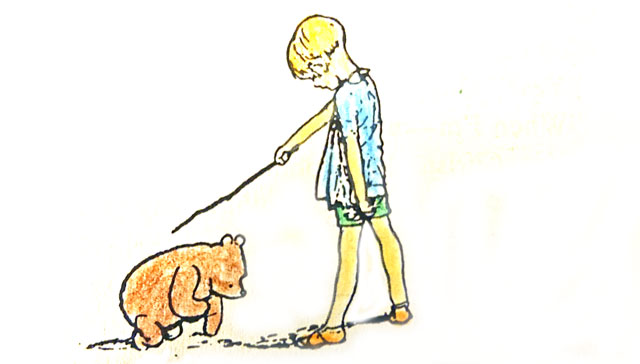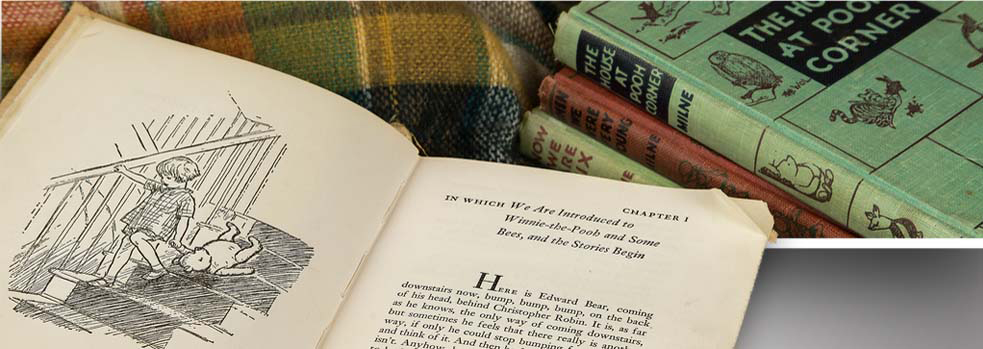
So Pooh rose and sat down and said
それでプーは立ち上がり、座って、言いました。
“Thank you,” which is a proper thing to say when you have been made a Knight,
「ありがとう。」それは騎士にしてもらったときに言うべき適切な言葉でした。
and he went into a dream again,
そして彼は再び夢の中に入りました。
in which he and Sir Pump and Sir Brazil and Factors lived together with a horse,
夢の中で、彼とポンプ卿とブラジル卿とそれぞれの係りは馬と一緒に暮らしました。
and were faithful Knights (all except Factors, who looked after the horse) to Good King Christopher Robin...
そして(馬の世話をする係りを除いて)みんな善良なクリストファー・ロビン王の忠実な騎士でした・・・
and every now and then he shook his head, and said to himself,
そして時々、プーは頭を振って、思いました。
“I'm not getting it right.”
「ボクはきちんと理解していない。」
Then he began to think of all the things Christopher Robin would want to tell him when he came back from wherever he was going to,
それから彼はクリストファー・ロビンが出かけているところから戻ってきてプーにその話をしたがるだろうことを考え始めました。
and how muddling it would be for a Bear of Very Little Brain to try and get them right in his mind.
そして頭のないクマが正しく理解するのはいかにこんがらがることかと思い始めました。
“So, perhaps,” he said sadly to himself,
「だから、たぶん、」彼は思いました。
“Christopher Robin won't tell me any more,”
「クリストファー・ロビンはこれ以上何も話してくれなくなるだろう。」
and he wondered if being a Faithful Knight meant that you just went on being faithful without being told things.
そして彼は忠実な騎士になるということは話してもらえなくても忠実であることなのかなと思いました。
Then, suddenly again, Christopher Robin, who was Still looking at the world with his chin in his hands, called out “Pooh!”
その時、突然、クリストファー・ロビンは、手にあごを乗せて世界を見ていましたが、「プー!」と叫びました。
「それぞれの係り」:原文では、Factors となっています。factor には 「要因」の他に「代理商」「問屋」「仲買人」等の意味がありますが、ここでは、城の中で「それぞれの役割をもった人」という意味だと思います。
"Yes?" said Pooh.
「何?」プーは言いました。
"When I'm--when-- Pooh!"
「ボクがープー!」
"Yes, Christopher Robin?"
「何、クリストファー・ロビン。」
"I'm not going to do Nothing any more."
「これ以上何もしないままではおれないんだ。。」
"Never again?"
「二度と?」
"Well, not so much. They don't let you."
「というより、みんながそうさせないんだ。」
Pooh waited for him to go on, but he was silent again.
プーは彼が話を続けるのを待ちましたが、彼は再び黙ってしまいました。
"Yes, Christopher Robin?" said Pooh helpfully.
「ねえ、クリストファー・ロビン?」プーは希望をもって言いました。
"Pooh, when I'm--you know--when I'm not doing Nothing, will you come up here sometimes?"
「プー、ボクがーあのー何もしないことをしていないとき、時々ここに来てくれるか?」
"Just Me?"
「ボクでいいの?」
"Yes, Pooh."
「そうだよ。」
"Will you be here too?"
「キミもここに来てくれる?」
"Yes, Pooh, I will be really. I promise I will be, Pooh."
「もちろん、プー、きっと来るよ。約束する、プー。」
"That's good," said Pooh.
「よかった。」プーは言いました。
"Pooh, promise you won't forget about me, ever. Not even when I'm a hundred."
「プー、ボクのことを絶対に忘れないと約束して。ボクが100歳になっても。」
注)not ~ any more :これ以上~ない
注)not so much :というよりも。not so much A as B (BというよりむしろAである)
注)really :本当に、きっと
注)promise I will be :来ると約束する(be は「行く、来る」という意味)
注)won't forget :絶対に忘れない(won't は強い否定)
注)even when : ~した時でさえ
Pooh thought for a little.
プーは少し考えました。
"How old shall I be then?"
「その時、ボク何歳?」
"Ninety-nine."
「99歳。」
Pooh nodded.
プーは頷きました。
"I promise," he said.
「約束するよ。」彼は言いました。
Still with his eyes on the world Christopher Robin put out a hand and felt for Pooh's paw.
まだ、世界を見ながら、クリストファー・ロビンは手を差し出して、プーの手を探しました。
"Pooh," said Christopher Robin earnestly, "if I--if I'm not quite" he stopped and tried again --
「プー、」クリストファー・ロビンは真剣に言いました。「もしーもしボクが、」彼は話を中断して、再び言おうとしました。
"Pooh, whatever happens, you will understand, won't you?"
「プー、何が起ころうと、分かってくれるね?」
"Understand what?"
「何を?」
"Oh, nothing." He laughed and jumped to his feet. "Come on!"
「おー、なんでもない。」彼は笑って、立ち上がりました。「さあ、行こう!」
注)earnestly :真剣に
注)whatever happens :たとえ何が起ころうと
注)jump to one's feet : さっと立ち上がる
"Where?" said Pooh.
「どこへ?」プーは言いました。
"Anywhere," said Christopher Robin.
「どこへでも。」クリストファー・ロビンは言いました。
So they went off together.
それで彼らは一緒に出かけました。
But wherever they go, and whatever happens to them on the way, in that enchanted place on the top of the Forest a little boy and his Bear will always be playing.
しかし、彼らがどこに行こうとも、途中彼らに何が起ころうとも、森の頂上の魔法の場所で、小さな男の子と友達プーはいつも遊んでいることでしょう。
~おわり~




